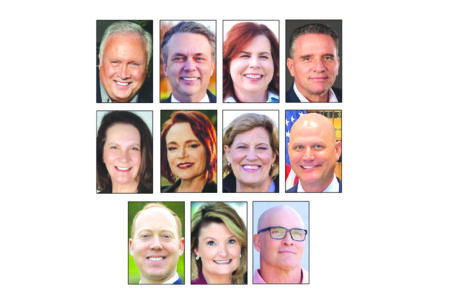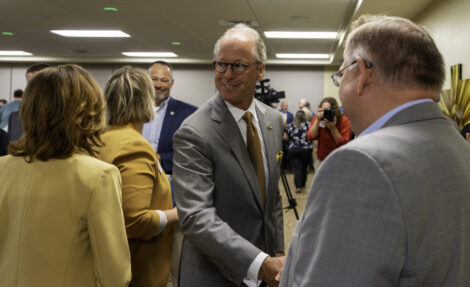State has reviewed 20,000 job titles to ensure DEI programs no longer exist in Kansas government
Senator wants to ensure changes aren't being made in name only

photo by: John Hanna/Associated Press
This photo from Friday, April 12, 2024, shows the sign above the door to the Office of Diversity, Equity, Inclusion and Belonging inside the main administration building on the main University of Kansas campus in Lawrence, Kan. Republican lawmakers across the U.S. are seeking to restrict diversity initiatives on colleges campuses, arguing that they enforce a liberal orthodoxy.
More than 20,000 job titles in the ranks of Kansas government have been searched — and if needed — scrubbed of words such as diversity, equity and inclusion, the state’s Secretary of Administration confirmed Tuesday.
Not only have the titles changed, but any employee who had duties related to diversity, equity and inclusion programs have had their jobs reworked.
“We are confident those positions do not exist, and if there was one that existed, those individuals are no longer conducting those duties,” Adam Proffitt, the Kansas Secretary of Administration, told the State Finance Council on Tuesday. “They’ve been reassigned elsewhere.”
Details on how many times such reassignments happened wasn’t provided Tuesday.
Proffitt addressed the State Finance Council as part of a new requirement approved by the Kansas Legislature during its last session. A budget proviso approved by the Republican-controlled legislature required Proffitt to certify that all state agencies — including the University of Kansas and other public universities — have ended all diversity, equity and inclusion programs.
That proviso included the elimination of DEI training programs and contracts that state agencies had with outside vendors to provide DEI services. Proffitt said he had certified agencies were complying with those provisions.
The proviso specifically requires all state agency employees by Aug. 1 to stop using their preferred pronouns — he/she, they/them, for example — on their email signature lines of official email accounts. KU officials announced that new policy to employees last week, which has drawn opposition, including from a national free expression organization who argues the state’s mandate is unconstitutional.
At Tuesday’s meeting of the State Finance Council — which is led by the governor and includes top legislative leaders — Proffitt said “to the best of his knowledge” all state agencies and universities are in compliance with the budget proviso related to DEI initiatives and pronoun use.
But the issue is likely to receive more scrutiny. Senate President Ty Masterson told the council that he had received a report that indicated one state university perhaps wasn’t fully in compliance with the DEI issue. Upon Masterson’s recommendation, the council instructed Proffitt to review the report referenced by Masterson and report back to the council next month.
During the meeting, which was held virtually, Masterson did not identify the university or the issues at hand. However, his office provided a copy of the report to the Journal-World after the newspaper requested it.
The report — produced by an unidentified student — alleges that Kansas State University has simply renamed a diversity and equity committee but did not change its DEI mission in any substantive way.
K-State previously had a Diversity, Equity, Inclusion and Belonging Committee but that committee has morphed into a reconstituted Community Engagement Committee. The report alleges the rebranding was superficial, and that “internal documents confirm that its structure, mission and funding practices remain unchanged.”
The University of Kansas was not specifically mentioned in Tuesday’s discussion, but KU has made multiple changes to its diversity and equity programs over the past couple of years — including reorganizing some units under a banner of “engagement.” Last year KU announced a reorganization that will bring many individual KU offices related to gender, sexuality, diversity and equality under one organizational umbrella and into shared space in the Kansas Union.
Specifically, KU created a new organization called the KU Student Engagement Center. The center was created by “reallocating staff and resources” from the Center for Sexuality and Gender Diversity, the Emily Taylor Center for Women and Gender Equity, the Office of Multicultural Affairs, and the Student Involvement and Leadership Center.
At the time, KU said the new office “will provide expanded support for students of varying identities, interests, and needs.”
Meanwhile, new policies related to how universities are limiting pronoun usage by their employees in email signature lines continues to draw opposition from a national First Amendment organization.
FIRE — the Foundation for Individual Rights and Expression — on Monday sent a letter to the Kansas Board of Regents asking the organization to change its guidance to the state’s universities in regards to the pronoun email signature issue.
As the Journal-World reported last week, FIRE officials largely concede that universities and other state agencies can mandate uniform signature lines for employees, and those signature lines do not have to include space for a listing of preferred pronouns.
However, FIRE’s letter to the Regents objects to the broad language of the policy that also prohibits any “gender ideology” in their signature lines. The policy doesn’t define the term gender ideology, and FIRE argues the inclusion of that phrase makes the policy unconstitutionally broad. The Regents’ guidance and the state law also state that a prohibition of expressing “gender ideology” applies to “e-mail signature blocks on state employee’s email accounts and any other form of communication.” FIRE has objected to the “other form of communication” phrase, arguing it also is too broad and vague.
The Kansas Board of Regents were in Manhattan on Tuesday as part of a three-day retreat, but the issue of the new state DEI requirements wasn’t a specific item on its discussion agenda.
In a brief interview, Regents President and CEO Blake Flanders said he had not yet seen the letter from FIRE, but said he does not anticipate the Regents doing a new review of the issue. He said the guidance from the Regents clearly adhered to the “relatively plain language” in the budget proviso.
Flanders said that concerns expressed by FIRE won’t best be addressed by the Regents but rather by lawmakers who created the budget proviso.
“Our role would be to follow what is legislated,” Flanders said.






